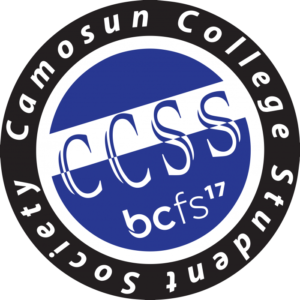Camosun College Student Society sponsored content
Did you know that the Camosun College Student Society (CCSS) is more than just health plans, food banks, Walk Safer services, and academic fairness? The CCSS knows that fighting for students’ rights is not just something that happens on campus but that policies made by provincial, federal, and sometimes even municipal governments have huge impacts on students.
A single college can not by itself have much influence, so the student society is a member of national, provincial, and municipal non-partisan lobby groups where the voice of students is amplified and often listened to by politicians at all levels.
“Before being elected as external executive, I did not realize how important federal and provincial advocacy is to Camosun students, both domestic and international,” says CCSS external executive Prince Solanki.
Provincially, the CCSS is a member of the British Columbia Federation of Students (BCFS). The BCFS was formed in 1975; today, over 170,000 students are BCFS members. The members are from 14 college and university student unions from across BC; current BCFS chair Jessie Niikoi is a former CCSS external executive (see wearebcstudents.ca for more info on the BCFS).
Aside from being a vehicle for students to organize and communicate collective interests on a broader scale than may otherwise be possible, the BCFS also provides services like student planners and discounts, as well as discounted promotional materials for members and member student unions.
The BCFS was largely responsible for getting the provincial government to put in place the 2005 tuition fee cap that regulates most BC domestic tuition increases. As well, the BCFS has been victorious in struggles pertaining to funding for student residences; the removal of interest on BC Student Loans; the BC Access Grant and the Adult Upgrading Grant; providing nasal naloxone to campuses; and tuition-free adult basic education and English language learning programs.
“As executive director, I have many meetings with our advocacy partners and am always amazed at how professionally student leaders can advocate for issues important to their fellow students and gain the support of politicians from all parties,” says CCSS executive director Michel Turcotte.
While education is largely a provincial responsibility, some funding and policies come from the federal level. Nationally, the CCSS is a member of the Canadian Alliance of Student Associations (CASA). CASA was formed in 1995 and currently has 23 full members as well as 16 prospective members. An additional strength of CASA is its unique partnership with the Quebec Student Union (UEQ) that really brings a pan-national reach to the organization. CASA works to make sure that the federal government continues to support post-secondary education generally and students directly (see casa-acae.com for more info on CASA).
“The Canada Student Loan and Grant program, and issues such as international student numbers and work hours, are controlled by the federal government,” says Solanki.
Some recent victories for CASA include the removal of interest on Canada Student Loans; the doubling of the Canada Student Grant during COVID-19; increasing off-campus working hours for international students; broadening eligibility requirements for Canada Student Loans Program; $80 million for the Student Work Placement Program; $75.2 million in additional support for First Nations, Inuit, and Metis Nation students; the continuation of the increased Canada Student Grant into the 2024-25 school year; and the protection of student “fair dealing” provisions of the Copyright Act.
“I am amazed by the quality of the training and information I am receiving from CASA, the BCFS, and CCSS staff to help me effectively lobby politicians and other officials,” says Solanki.
On a municipal level, the CCSS is a member of Greater Victoria Acting Together (GVAT; gvat.ca) and other community, labour, and religious congregations to promote positive changes in the capital region on issues such as housing, mental health and addictions, and climate justice.
“There is strength in working together with others, and I have always encouraged the CCSS to be active participants at all governmental levels,” says Turcotte. “I have seen the direct positive benefits on Camosun’s students of our direct and collective lobbying efforts.”
See camosunstudent.org for more info on the CCSS.

